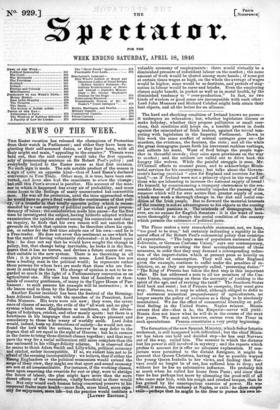NEWS OF THE WEEK.
THE Easter vacation has released the champions of Protection from their watch in Parliament ; and either they have been ne- glecting their self-assumed duties, or they have been, with all their might and main, " appealing to the country." Threats were held out, that the said country would take the first opportu- nity of pronouncing sentence on Sir Robert Peel's policy ; and everybody looked to the Easter recess as that first occasion. No such sign is made. The sole notable product of the season is a sign of quite an opposite kind—that of Lord Essex's declared conversion to Free Trade. Other men, it is true, have been con- verted, and have also had the manliness to avow the change ; but still this Peer's avowal is peculiar. His account of the man- ner in which it happened has every air of probability, and must come home to the feelings of many unconverted but convertible men. He was all for protection, until the time approached when he nould have to give a final vote for the continuance of that poli- cy, or a transfer to that totally opposite policy which is recom- mended by a vast majority of political parties and a great prepon- derancy of talent: the consideration made him pause—for the first time he investigated the subject, having hitherto adopted without examination the opinion current among his connexions and class ; on inquiry, he finds that his own reason will not sanction the grounds on which that opinion rests; he therefore alters his opin- ion, or rather for the first time adopts one of his own—and he is a Free-trader. He does not avow this sentiment as one which he has the merit of having voluntarily elaborated—it is forced upon him : he does not say that he would have sought the change in policy, but, that change being inevitable, he looks it in the face, learns that it has no terrors, and devises a future course of con- duct suitable to the new system. There is no theorizing in all this ; it is plain practical common sense. Lord Essex has not been a leading man in the political world; he represents rather those in for whom laws are made than those who are fore- most n making the laws. His change of opinion is not to be re- garded so much in the light of a Parliamentary conversion as an agricultural one. His case has been that of hundreds or thou- sands of country gentlemen, of many in the Upper House of Par- liament : to such persons his example will be instructive ; it is the lesson read to them by the Easter recess. Another Easter incident has been the festival of the Birming- ham Athenic Institute, with the speeches of its President, Lord John Manners. His texts were not new ; they were, the sever- ance of classes of society, the evils of the " all work and no play " system which treats Englishmen as machines, and the advan- tages of holydays, cricket, and other manly sports : but there is a heartiness in his language that makes it always pleasant and consolatory to those who weary of worldly strife. Lord John would, indeed, keep up distinctions of society—he would not con- found the lord with the artisan, however he may defer to the dogma that all are equal in the sight of Heaven : but he is earnest in the desire to bring those distinct classes together; and that may pave the way for a social millennium still more complete than the one embraced in his village-felicity scheme. It is observed that he seems to think Adam Smith and Lillywhite, political economy and cricket, rather incompatible. If so, we exhort him not to be afraid of the seeming incompatibility : we believe, that if either the Wong Englanders or the political economists would extend the scope of their view, they might see that sport and sound economy are not at all irreconcileable. For instance, if the working classes, bent upon reserving the eventide for rest or play, were to abridge the hours of labour, the plan might have more than the mere direct effects of the recreation, vitally beneficial as those would be. Not only would each human being concerned preserve to his corporeal frame more health—more flesh, niore blood, more capa- city for enjoyment, more life—but the practice would institute a valuable economy of employments : there would virtually be a diminished pressure of redundant labour on the market ; the same amount of work would be shared among more hands ; if none got at certain times wages so high, on the whole the average of wages would be higher, none would be so destitute, and periods of stag- nation in labour would be rarer and briefer. Even the employing classes might benefit, in pocket as well as in moral health, by the diminished tendency to " over-production." In fact, no two kinds of wisdom or good sense are incompatible with each other : Lord John Manners and Richard Cobden might both attain their best objects, and all the better for an alliance.


























